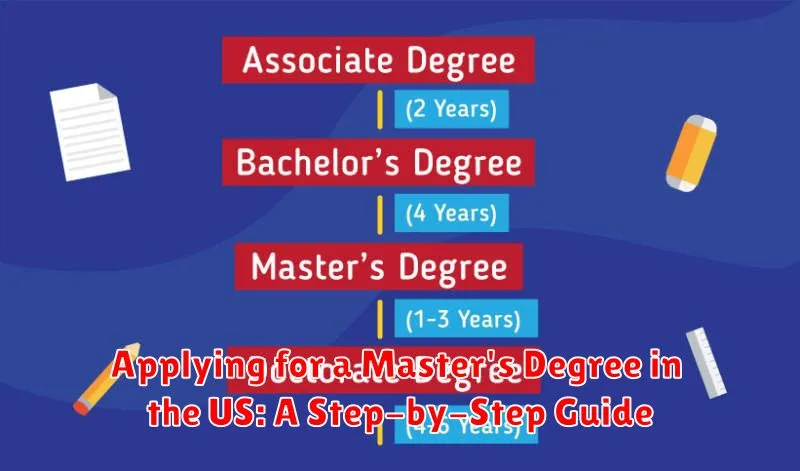Embarking on a journey towards a Master’s degree in the US can be a transformative experience. This comprehensive, step-by-step guide provides prospective graduate students with the essential knowledge and resources necessary to navigate the often complex application process. Whether you’re aiming for a Master of Science, a Master of Arts, or a specialized Master’s program in the United States, this guide will illuminate the path from researching universities and preparing application materials to securing funding and ultimately succeeding in your chosen field of study. Understanding the intricacies of GRE, TOEFL, letters of recommendation, and statements of purpose is crucial for a successful application. This guide covers it all, offering invaluable insights into each step of the US Master’s degree application journey.
From defining your academic goals and selecting the right US universities to crafting a compelling statement of purpose and securing financial aid, this guide addresses the crucial elements of a successful Master’s degree application. Learn how to effectively showcase your qualifications, research program requirements, and understand the nuances of the US higher education system. By following this step-by-step guide, you’ll gain the clarity and confidence needed to navigate the application process and ultimately achieve your goal of pursuing a Master’s degree in the United States. Prepare to unlock your academic potential and embark on a rewarding educational experience with the help of this detailed guide on applying for a Master’s degree in the US.
Research Programs and Requirements
Research-focused master’s programs generally require a more extensive research component compared to professionally oriented programs. This often culminates in a thesis or research project.
Admission requirements typically emphasize prior research experience. Look for programs aligning with your research interests and faculty expertise. Letters of recommendation highlighting your research capabilities are crucial. Some programs may require a GRE Subject Test in your chosen field.
Understand Visa Requirements
Securing the correct visa is crucial for international students pursuing a Master’s degree in the US. The most common visa is the F-1 student visa.
You’ll need to be accepted into a Student and Exchange Visitor Program (SEVP) certified institution. After acceptance, the institution will issue you a Form I-20, which is necessary to apply for your visa at a US embassy or consulate in your home country.
Prepare Standardized Tests

Most US master’s programs require standardized tests. GRE (Graduate Record Examinations) is common, but some programs may require the GMAT (Graduate Management Admission Test) or other specialized tests. Check specific program requirements.
Register early for your chosen test to secure your preferred date and location. Begin studying several months in advance, utilizing practice tests and study materials.
A competitive score is crucial for admission. Aim for scores within or above the average range of previously admitted students, which is often published on program websites.
Build Your Academic Resume
A strong academic resume, often referred to as a Curriculum Vitae (CV), is essential for Master’s degree applications. Unlike a traditional resume, your CV should comprehensively detail your academic achievements.
Key elements to include are your educational background, GPA, relevant coursework, research experience, publications, presentations, academic awards and honors, and professional affiliations. Quantify your accomplishments whenever possible.
Tailor your CV to each program you apply to, highlighting experiences relevant to the specific field of study. A well-crafted CV demonstrates your academic preparedness and potential for success in graduate school.
Request Strong Recommendation Letters
Strong letters of recommendation are crucial for your application. Request letters from professors or supervisors who know you well and can speak to your academic abilities, research skills, and overall potential.
Give your recommenders ample time (at least 4 weeks) to write their letters. Provide them with your transcripts, resume/CV, and a statement of purpose to help them write a more informed and persuasive recommendation.
Write a Compelling Statement of Purpose
The Statement of Purpose (SOP) is a critical component of your application. It provides the admissions committee with insight into your academic and professional background, your reasons for pursuing a master’s degree at their institution, and your future aspirations.
Clearly articulate your research interests and how they align with the program’s faculty and resources. Explain any relevant experiences, skills, or unique qualities that make you a strong candidate. Showcase your passion for the chosen field and demonstrate your preparedness for the rigors of graduate study.
Understand Application Deadlines
Meeting application deadlines is crucial for your master’s program application. Deadlines vary significantly between universities and programs. Some programs have rolling admissions, while others have fixed deadlines.
Research your target programs early and note their specific deadlines. Missing a deadline can disqualify your application. Plan ahead and submit all required materials well in advance.
Submit Official Transcripts
Submitting official transcripts is a crucial step in the application process. Universities require these documents to verify your academic background and evaluate your qualifications for the program.
Official transcripts must be sent directly from your previous institution(s) to the admissions office of the university you are applying to. Ensure they are sealed and tamper-proof. Contact your previous institution’s registrar’s office to initiate the transcript request process.
Deadlines for submitting transcripts are usually strict, so pay close attention to the application requirements and ensure your transcripts arrive on time.
Plan Financial Documents
Gathering your financial documentation is crucial for your US master’s application. This proves you can fund your studies and living expenses. Start early, as acquiring these documents can take time.
Typically, you’ll need bank statements showing sufficient funds, sponsorship letters (if applicable), and possibly proof of loan pre-approval. Check the specific requirements for each university you’re applying to.
Prepare for the Interview (if required)
Not all programs require interviews, but if your chosen program does, thorough preparation is essential. Review your application materials, including your statement of purpose and resume. Be prepared to discuss your academic background, research interests, and career goals.
Practice answering common interview questions, such as “Why this program?” and “Why this university?”. Prepare thoughtful questions to ask the interviewer as well. This demonstrates your genuine interest and engagement.
Professional attire is recommended for the interview, even if it’s conducted virtually. Ensure a quiet and distraction-free environment for a virtual interview, and test your technology beforehand.

